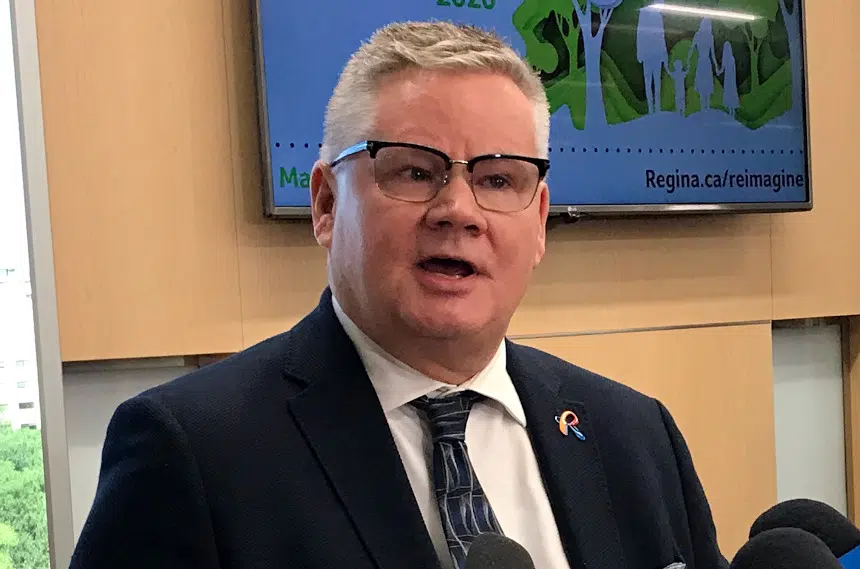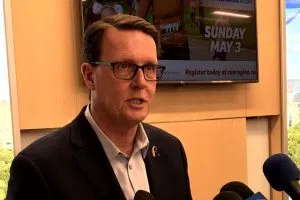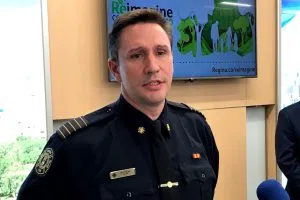Regina’s mayor, city manager and fire chief are confident in their planning for COVID-19.
However, as of a briefing on Friday morning, many decisions had yet to be made.
Mayor Michael Fougere said it was important to note that Regina didn’t have any known cases, but that doesn’t mean the city can’t be cautious and prepared.
He said the city has a strong and robust response and it’s relying on the Saskatchewan Health Authority’s guidance for a lot of things.
“Our priority as a city, absolutely, is the health and safety and the protection of all Regina residents,” said Fougere.
Keeping business going
City manager Chris Holden echoed those sentiments, saying the city has been talking with federal and provincial officials since December about the virus.
He said the city is concentrating on making sure essential services like police, fire, garbage and water can continue if things get worse. When it comes to water and wastewater, Holden said they’ve had conversations with the water plant and the wastewater treatment plants.
“They have business continuity plans in place and we have every confidence that the relationships that we have, they will be able to maintain both water and wastewater services for citizens,” said Holden.
City crews are going to be as flexible as possible when it comes to utility hooks up and disconnects to accommodate people who might be sick or are isolating, and the Holden said the city is willing to be flexible on payments in cases where a person can prove financial hardship because of the virus.
“If people are ill, if people have to self-isolate, obviously we don’t want to be seen as being obstructionist in terms of making sure that people can have access to services,” explained Holden.
City facilities
The city has about 200 different lines of business, from transit to recreation centres to libraries, and Holden said they’re all going to stay open for now, but Holden said that could change by the day or the hour.
“Obviously there is a concern about the gatherings in terms of large numbers,” he said. “We’re evaluating that, we’re paying attention to that and we may at some point — and again it’s close contact and communication with the health authority — we may be required to close a facility to restrict public access.”
The city has several events coming up like the I love Regina run and the Imagine Regina conference, and they’re evaluating each of these. Fougere said decisions will be made soon.
The city is also discussing what to do about city council meetings and committee meetings. Fougere said they could leave the meetings as they are, they could ask for written submissions only and not have audiences, or they could have councillors telecommute.
Fougere explained there are some substantial issues coming up at council at the end of the month and administrators expect a large crowd, so they want to keep the public safe.
Emergency services
City police have a plan in place to deal with the virus, as their members come into contact with the public every day.
Regina Fire and Protective Services are also planning. Chief Layne Jackson said the virus doesn’t change how or what they respond to, but it does change their preparedness when it comes to medical calls.
“We have our infectious disease control kits on the trucks and they’ve been updated several weeks ago. Our staff has received procedures and directions on how to utilize those and when to utilize them. And they’re staying informed and educating themselves on the symptoms and the requirements to protect themselves,” explained Jackson.
Jackson said the department has also activated the emergency operations centre, which is concentrating on monitoring, reporting and readiness right now. The operations centre created a forum and structure of organization, explained Jackson, which gets all the necessary services in the same room and they can share information.
Listening for direction
How plans change and evolve will depend on how the virus spreads and how hard Regina is hit. The city is relying on guidance from the province and health authority on many things.
“I think it’s inevitable that we’re going to have diagnosed cases in Regina, confirmed cases in Regina, that will then drive the Ministry of Health and the health authority to come out with those statements about minimizing gatherings and whether there’s 250 people or a number that’s slightly higher,” said Holden.
Holden said it was explained to him that factors that would go into making those decisions include how many cases there are in the area and whether there is sustained community transmission.
According to Holden, the city has also had preliminary conversations with the health authority and the province about possibly using city facilities for things like quarantine sites or testing centres if needed.
“So, depending on the extent to which the virus hits our community, the health authority does not want people going to the hospital or to the emergency room or even to a medical centre to get tested. So they may, at some point, work with the city to say, ‘We’re going to set up a testing facility, it’s a separate facility,’ and they can put all the precautions that they need in place to protect the health of their workers, but also the citizens that are coming to be tested,” said Holden.
Fougere, Holden and Jackson all encouraged people to do what they can to stay healthy and stop the spread of the virus, including hand-washing and practising social distance.
“We’re going to do our part, but it’s really important that citizens and participants in our programs take that extra step to make sure that they’re taking care of their own hygiene in terms of hand-washing,” said Holden.
Anyone with questions about city services is invited to go to the city’s website to find information, or call the main help line at 306-777-7000.













